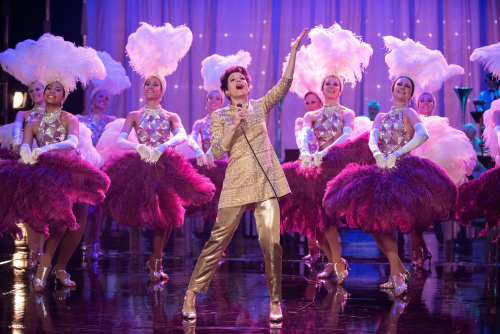
David Hindley/Roadside Attractions
MOVIE REVIEW
Judy (2019)
No amount of yellow bricks can hide the fact that we are on a familiar road with “Judy.” The film has a similar look and feel to 2018’s “Stan & Ollie,” with both movies following Hollywood legends experiencing hard times during the twilight of their careers. Where Laurel and Hardy battled changing audience tastes and deteriorating health, the trials faced by the late Judy Garland were partially self-inflicted. Where love and affection were absent in her life, the actress would often fill the void with pills and booze.
Garland was a victim of the studio system; a talented ingénue swallowed up by M-G-M and spat out many years later as an emotional wreck. Rupert Goold’s movie is at great pains to make this clear, opening with the first of several scenes in which Judy (Darci Shaw) is cruelly manipulated. We see M-G-M head Louis B. Mayer giving his latest meal ticket a choice, does she want fame and fortune or merely to live in obscurity along with all the other schmucks? Well fame costs and the studio lot was where Judy Garland would start and never really stop paying. Mayer’s fingers linger just a little too long on Judy’s body, supporting claims that his interest in the actress was more than just professional.
Flash-forward to 1968 and Judy (Renée Zellweger) still burns with talent but is a physical and mental shadow of what she once was. Her film career is over, her last tour – in Australia – was an embarrassment. One of her several ex-husbands – Sidney Luft (Rufus Sewell) – wants custody of their children. So what’s a cash-strapped falling star to do but accept a five-week run at The Talk of the Town nightclub in London? Far easier than the schlep around the U.K. that Laurel and Hardy had embarked on more than a decade earlier. The man behind that tour was Bernard Delfont (Michael Gambon), who also owned The Talk of the Town. Had they simply aged up Rufus Jones from “Stan & Ollie,” then this might have been the nascence of a Bernard Delfont Cinematic Universe.
Anyway, Garland arrives in a London that is a mix of postwar drabness and swinging style. The stroll down Carnaby Street shown in the movie lacks only Austen Powers and some go-go dancers. Being in the capital and away from her children does nothing to stop Judy’s decline. Her assistant, played by the marvelous Jessie Buckley, is initially in awe of her latest star-sitting assignment but that doesn’t last. She is tasked with getting Judy out of her hotel room and sober enough to honor the live engagements. Often Garland is not quite able to pull it off and the evenings end with outraged audiences, catcalls and the odd projectile being thrown.
Judy picks up yet another husband in Mickey Deans (Finn Wittrock) – the movie fluffs the timeline a little here. He’s a man with lots of ideas for revitalizing his wife’s career – a record with the Rolling Stones, for example – but is less adept at bringing these notions to fruition. There is no happy ending in sight for Judy, no last minute salvation. What the film gives us – as Garland asks for one last chance to make her audience happy – is a final scene which will either break your heart or make your toes curl up like those belonging to the Wicked Witch of the East. Presumably if you are actively seeking a film about Judy Garland then you may be open to the odd moment of corny magic.
“Judy” is a perfectly fine film, as adeptly executed as any good biopic can be. Such things normally rely on the accuracy of the central performance, and Ms. Zellweger pretty much nails it whether breaking down offstage or belting out classic tunes onstage. The wobbly Ms. Zellweger pout is a good match for a character that is so desperate to be loved. The role is pure Oscar bait, of course, but that shouldn’t detract from the actress’s remarkable achievement.
With such a downbeat story the musical numbers come as a blessed relief with their big-band splendor and fan-swishing showgirls. You can even forgive the movie’s occasional trip into la-la land. Sometimes it’s little things such as Judy making a lengthy call to the States from a London phone box without ever being asked to insert more money. But then there is the inclusion of Judy superfans, a gay couple who show up each night without fail – all very good. But then they meet the star at the stage door and she decides to pop round to their home for an omelette and a sing-song. You so want this to be true and for the credits to include a photo of the real-life pair smiling alongside their heroine. But sadly it’s just made up.
This scene is apparently included to show the iconic status of Judy Garland in gay culture but, who knows, it might well encourage stage door stalkers who are super-hyped by the idea that their favorite star could really pop round for a pot of tea and a spot of Netflix. No need to fill the Internet with opinion on whether “Joker” is potentially dangerous. It could be “Judy” that we should be worrying about. Still, the chasm between the fantasy of what fame might offer up and the possible crushing disappointment of what it actually delivers are themes which occupy the very core of “Judy.”
Comments